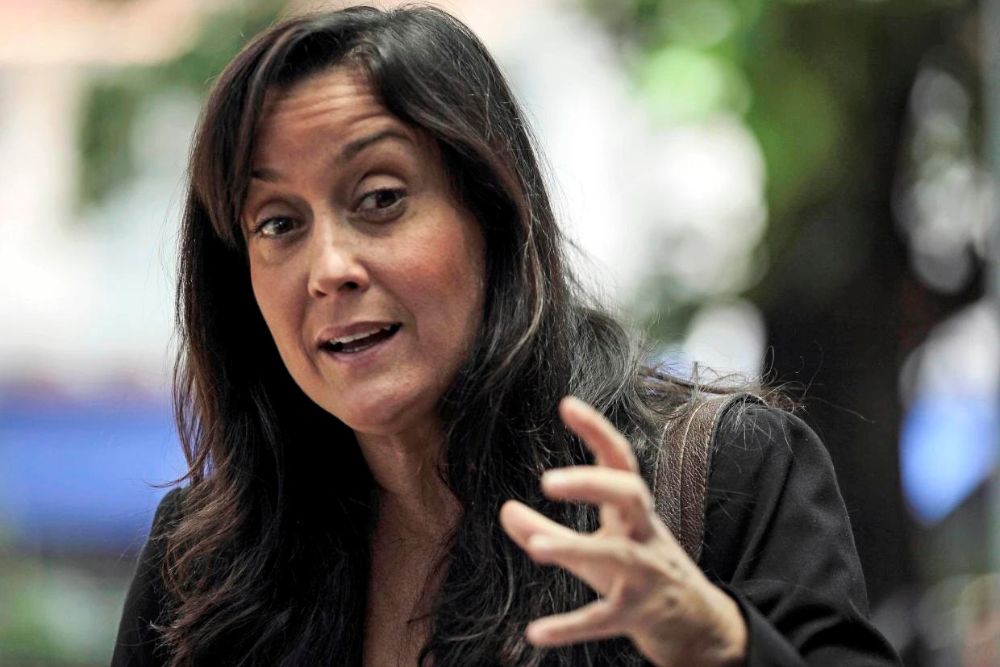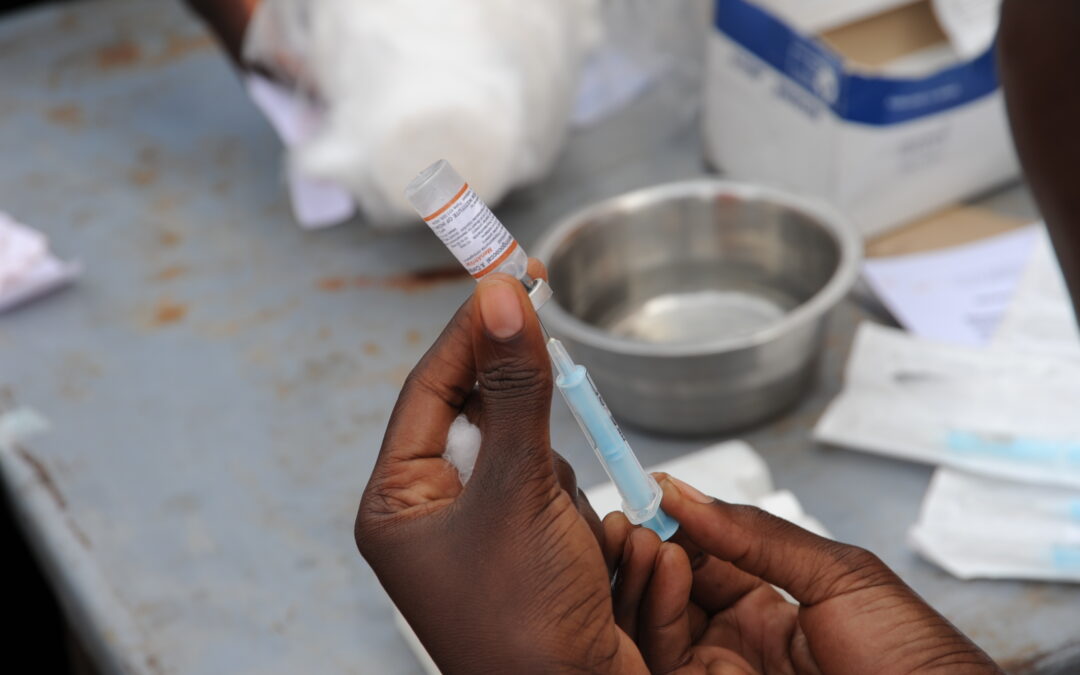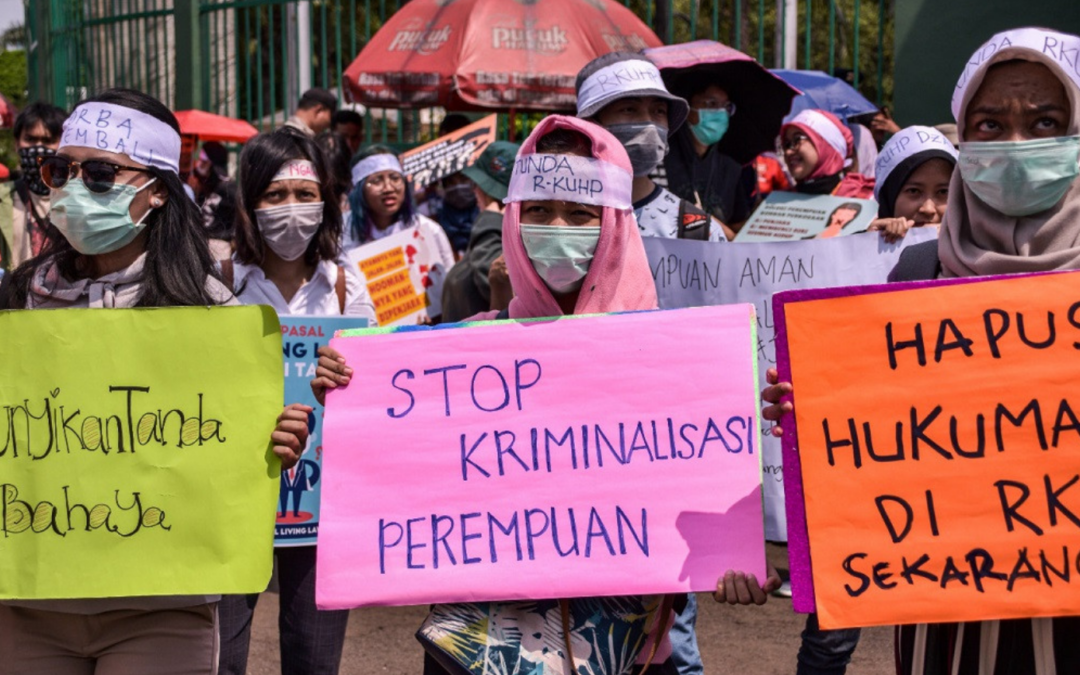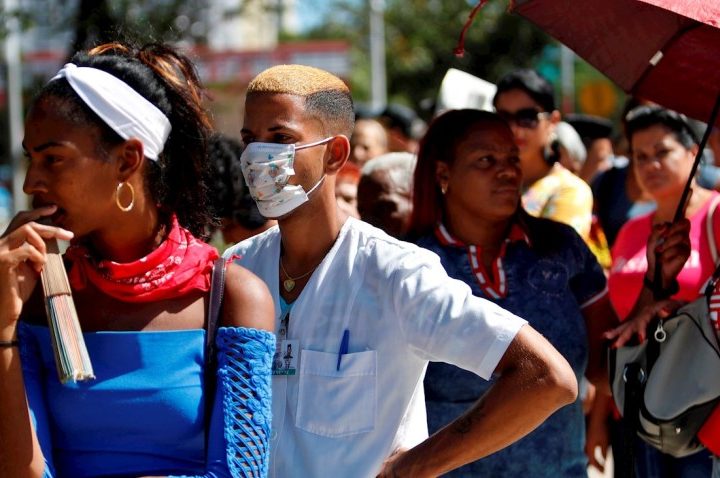


Sri Lanka: Stop unnecessary “psychiatric evaluations” based on sexual orientation
An opinion piece by Mathuri Thamilmaran, ICJ National Legal Advisor in Sri Lanka.

Human rights and universal access to COVID-19 vaccines: does the Human Rights Council resolution go far enough?
[TOC]By Tim Fish Hodgson, Legal Adviser on Economic, Social and Cultural Rights at the International Commission of Jurists and Rossella De Falco, Programme Officer on the Right to Health at Global Initiative on Economic, Social and Cultural Rights.
Historically pandemics have often catalyzed significant social change. As historian of epidemics Frank Snowden puts it: “epidemics are a category of disease that seem to hold up the mirror to human beings as to who we really are”. At the moment gazing in that mirror remains a regrettably unpleasant experience.
United Nations human rights Treaty Body Mechanisms and Special Procedures, the World Health Organization (WHO), UNAIDS and numerous local, regional and international human rights organizations have produced reams of statements, resolutions and reports bemoaning the human right impacts of COVID-19 and almost every single aspect of the lives of almost all people around the world. The latest being the UN Human Rights Council Resolution adopted today by consensus on “Ensuring equitable, affordable, timely and universal access for all countries to vaccines in response to the coronavirus disease (COVID-19) pandemic”.
Key amongst the human rights law and standards underpinning these analyses is the protection of the right to the highest attainable standard of health, which, certainly for the 171 States Parties to the International Covenant on Economic, Social and Cultural Rights places an obligation on States to take all necessary measures to ensure “the prevention, treatment and control of epidemic, endemic, occupational and other diseases”, and, in the context of access to medicines the right to “enjoy the benefits of scientific progress and its applications”.
Despite these legal obligations, in late February, the UN Secretary General António Guterres felt compelled to highlight the rise of a “pandemic of human rights abuses in the wake of COVID-19”, including, but extending beyond violations of the right to health. The impact of COVID-19 on human rights has, and continues to be, sufficiently ubiquitous that an Indonesian transwoman activist Mama Yuli perhaps captured it best when telling a journalist that she and others in her position were “living like people who die slowly”.
Vaccines for the few, but what about the many?
Disappointingly, however, instead of a symbol of hope of a light at the end of the Coronavirus tunnel, the COVID-19 vaccine has fast become yet another pronounced illustration of the parallel pandemic of human rights abuses described by Guterres. The disastrous state of COVID-19 vaccine production and distribution throughout the world – and even within particular countries where vaccines are available – is now often described by many activists, including significantly the People’s Vaccine campaign, as “vaccine nationalism” and profiteering which has produced a “vaccine apartheid”.
What this means, in human rights language, is that States have often arranged their own affairs in a way that is detrimental to access to vaccines in other countries in spite of their extraterritorial legal obligations to, at very least, avoid their actions that would foreseeably result in the impairment of the human rights of people outside their own territories.
It is worth emphasizing that it has still been only some four months since the first mass vaccination campaigns began in December 2020. At the time of writing, approximately 450 million people had been vaccinated worldwide, while many African nations, for example, had yet to administer a single dose. While in North America 23 COVID-19 vaccine doses have been administered per 100 hundred people, with the number standing at 13/100 in Europe, the ratio decreases dramatically in the Global South with 6.4/100 in South America, 3.8/100 in Asia, 0.7/100 in Oceania and a mere 0.6/100 in Africa.
Vaccines, State Obligations and Corporate Responsibilities
The inadequate and inequitable distribution of vaccines has a variety of causes.
First, is the generally dysfunctional nature of the global health system due to what the UN Committee on Economic, Social and Cultural Rights described in its first statement on COVID-19 as early as April 2020 as “decades of underinvestment in public health services and other social programmes”. The incredible inequities caused by privatization of healthcare services, facilities and goods in the absence of sufficient regulation is well-documented, both in the Global North and the Global South.
Second, are the obstacles to vaccine access created and maintained by States, singly but collectively in the form of intellectual property rights regimes. This is not for a lack of guidance or legal mechanisms to ensure the flexible application of intellectual property protections in favour of the protection of public health and the realization of the right to health. The TRIPS agreement is an international legal agreement concluded by members of the World Trade Organization which sets minimum standards for intellectual property rights protections.
States are specifically permitted to interpret intellectual property rights protections “in the light of the object and purpose of” TRIPS and States therefore retain “the right to grant compulsory licences and the freedom to determine the grounds upon which such licences are granted” in the specific context of public health emergencies. Nor is it the first time that epidemics have necessitated the engagement of flexible arrangements to ensure expeditious, universal, affordable and adequate access to life saving medications and vaccines.
This is why the majority of States and an overwhelming majority of civil society actors have supported South Africa and India’s request that the WTO issue a “waiver” of the application of intellectual property rights for COVID-19 “diagnostics, therapeutics and vaccines”. This request has also been formally supported by a number of independent experts of the UN Human Rights Council of UN Special Procedures, and recently received the emphatic endorsement of the UN Committee on Economic, Social and Cultural Rights. There is already precedent for such TRIPS waivers, with the WTO having already applied a waiver until 2033, for example, for least-developed countries (LDCs), which are exempted from applying intellectual property rules on pharmaceutical products and clinical data.
Disappointingly, however, the ink had barely dried on the issuing of the CESCR’s statement, when, plainly disregarding all of these recommendations, the waiver was blocked by a coalition of wealthier nations, many of whom already have substantial and advanced vaccine access. Importantly, the CESCR’s recommendations were not just made on vague policy grounds, but as the best way to fulfill States’ clear legal obligation in ICESCR that, “production and distribution of vaccines must be organized and supported by international cooperation and assistance”.
The recently adopted Resolution of the UN Human Rights Council, led by Ecuador and States of the Non-Aligned Movement and adopted on 23 March 2021 provides some hope of the alteration of this existing collision course with disaster. The resolution, which calls for “equitable, affordable, timely, and universal access by all countries”, reaffirms vaccine access as a protected human right and openly acknowledges “unequal allocation and distribution among countries”.
The resolution proceeds to call on all States, individually and collectively, to “remove unjustified obstacles restricting exports of COVID-19 vaccines” and to “facilitate the trade, acquisition, access and distribution of COVID-19 vaccines” for all.
However, despite the protestations of civil society organizations involved in deliberations about the resolution, the resolution only restates the right for States to utilize TRIPS flexibilities, as opposed to endorsing such measures as a best practice for realizing State human rights obligations. This tepid approach (which follows principles of international trade while, ironically given the resolution emanates from the Human Rights Council, ignoring human rights standards) to perhaps the pressing issue relating to vaccine access is inconsistent with the Resolution’s otherwise firm grounding of vaccine access in human rights. It therefore remarkably even falls short of insisting that States comply with their own long-established international human rights obligations.
The resolution also inexplicably fails to address corporate responsibilities, including those of pharmaceutical companies, to respect the right to health in terms of the UN Guiding Principles on Business and Human Rights, and States’ corresponding duty to protect the right to health through adopting adequate regulatory measures.
Third, and connected to the above, is the general failure of States to fully and adequately centre their human rights obligations in the broader context of COVID-19 responses worldwide. The subtle but important phrasing of the exercise of TRIPS flexibilities as a “right of States” rather than as one of the optimal ways of fulfilling an obligation, exposes the degree to which the attitudes by State policy makers and legal advisors towards and understanding of human rights are out of sync with the obligations that they have willingly assumed by becoming party to treaties like the ICESCR.
A Critical Moment: it does not have to be this way
As Snowden’s insightful work predicted, the COVID-19 pandemic represents a critical moment in human history. States, collectively and individually, are presented with a unique opportunity to set a precedent and begin to seriously address the root causes of inequality and poverty which are prevalent across the world.
Making the right decision and taking a moral stand on the importance of access to COVID-19 vaccines is both practically and symbolically important if these efforts are to succeed. Vaccines must be accepted and acknowledged as global public health goods and human rights. Private companies too should not stand in the way of equitable and non-discriminatory vaccine access for all people.
For this to happen, bold leadership is required from international human rights institutions such as the UN Human Rights Council, the UN General Assembly and the WTO. Unfortunately, at present, not enough has been done and politicking and private interest continue to trump principle and public good. Until this changes, many people around the world will continue to exist, “living like people who are dying slowly”. It does not have to be this way.
Vaccine patents: healthy or harmful?
An opinion piece by ICJ Commissioner, Rodrigo Uprimny, asks whether the existing COVID-19 vaccine patenting arrangements favouring the intellectual property interests of pharmaceuticals come at an unacceptable cost to protecting the life and health of millions. Commissioner Uprimny is also Researcher at Dejusticia and member of the UN Committee on Economic, Social and Cultural Rights.
During an informal conversation I was asked:
“Why is it that, although so many of us are dying due to COVID-19 and suffering from the dramatic state of the economy, we continue to wait for vaccines despite the availability of so many safe and effective ones? Is it that we cannot produce the vaccines locally?
The answer to this simple but essential question is that vaccine access is no longer a technical but also a political issue.
While Colombia cannot technically manufacture or produce some COVID-19 vaccines such as those based on the RNA messengers, many other countries, including several in the global South such as India, Argentina or Brazil, could. As has been highlighted by Doctors without Borders, there is no technical obstacle to mass vaccine production that would allow to vaccinate every one of the 7.8 billion human beings on earth within a few months
Instead, the obstacle is legal and political. It is the intellectual property that provides patents to pharmaceutical companies, who have developed COVID-19 vaccines. That creates a temporary monopoly. During such a temporary monopoly period, which usually lasts 20 years, no other company can produce their vaccines without permissions. As a consequence, those companies can impose and regulate the prices and conditions for the production of their vaccines.
Patents are defended by high-income countries, where many large pharmaceutical companies are based. They argue that there would be no innovation without patents as companies would not have incentives to research and develop new products.
Here, I will not dispute this defense of intellectual property, which is highly debatable. I would instead like to pose this question: even if patents were good and helped innovation, is it fair that they remain intact during the COVID-19 pandemic if they prevent rapid access to vaccines all over the world? The answer to this question is no, because we are condemning millions of people to die, but also because the epidemiological risks are extremely high. Each contagion poses a new risk for a novel coronavirus mutation that may eventually result in a variant that could escape the efficacy of current vaccines. It is also possible that a new mutation has a severe impact on the health of children, who have been somewhat spared from the more lethal impacts of COVID-19 until now.
In light of the current situation, without challenging the institution of intellectual property as such, South Africa and India issued a proposal to the World Trade Organization, the international organization overseeing such trade-related issues. They proposed a temporary exemption (or “waiver”) of patents on vaccines and treatments for COVID-19 at least until the pandemic is under control. A potential, fair compensation for companies who discovered the vaccines might also been considered, although obviously discounting the immense financial support they have already received from public funding.
This temporary exemption is crucial as current flexibilities in patent rights, such as compulsory licenses, are too rigid and limited to face the current crisis. This waiver provides the only opportunity for companies and States, with sufficient technical capabilities, to mass-produce necessary vaccines without having to fear the severe penalties of patent (intellectual property) violations.
While this proposal continues to face resistance from certain countries in the Global North, it is receiving growing support from many states, scientific and humanitarian organizations. Regrettably, the Colombian government has refrained from supporting it, with the shameful argument that more evidence needs to be provided. More evidence of what? Does it not suffice that we currently do not have access to necessary vaccines, although technically we could produce ample amounts? Or that available vaccines are, above all, headed to high-income nations? And is this mainly due to patents on vaccines that, far from being a fair award for innovation, seem to be letters of marque in favor of pharmaceutical companies, without any consideration of deaths and harms caused by the global lack of COVID-19 vaccines?
This op-ed was first published on El Espectador, 27 February 2021.
Download the Op-Ed in English and Spanish.
ICJ Statements on Vaccine Access:
Global: “ICJ calls on States to ensure human rights compliant access to COVID-19 vaccines (UN Statement)”: (1 March 2021)
Global: “ICJ urges the UN Committee on Economic, Social and Cultural Rights to call on States to comply with their obligations to ensure equitable access to vaccines for all” (15 Feb 2021): https://www.icj.org/icj-urges-the-un-committee-on-economic-social-and-cultural-rights-to-call-on-states-to-comply-with-their-obligations-to-ensure-equitable-access-to-vaccines-for-all/
Peru: “The COVID-19 vaccine demands international and national solidarity” (23 Feb 2021): https://www.icj.org/the-covid-19-vaccine-demands-international-and-national-solidarity/
Africa: “The ICJ recommends that the African Union acknowledge COVID-19 vaccines are a “public good” (4 Feb 2021): https://www.icj.org/the-icj-recommends-that-the-african-union-acknowledge-covid-19-vaccines-are-a-public-good/
Zimbabwe: “The ICJ and ZimRights ask for urgent intervention on access to COVID-19 vaccines from African Commission Mechanism” (19 Feb 2021): https://www.icj.org/the-icj-and-zimrights-ask-for-urgent-intervention-on-access-to-covid-19-vaccines-from-african-commission-mechanism/
Further reading:
UN Special Procedures: “COVID-19: UN experts urge WTO cooperation on vaccines to protect global public health” (1 March 2021): https://www.ohchr.org/EN/NewsEvents/Pages/DisplayNews.aspx?NewsID=26817&LangID=E
UN Special Procedures: “Statement by UN Human Rights Experts Universal access to vaccines is essential for prevention and containment of COVID-19 around the world” (9 Nov 2020): https://www.ohchr.org/EN/NewsEvents/Pages/DisplayNews.aspx?NewsID=26484&LangID=E
UN CESCR Committee: “Statement on universal and equitable access to vaccines for the coronavirus disease (COVID-19)” (27 Nov 2020) https://tbinternet.ohchr.org/_layouts/15/treatybodyexternal/Download.aspx?symbolno=E/C.12/2020/2&Lang=en
IACHR and its SRESCER: “IACHR and its SRESCER Call on American States to Make Public Health and Human Rights the Focus of All their Decisions and Policies Concerning the COVID-19 Vaccine” (5 Feb 2021): http://www.oas.org/en/IACHR/jsForm/?File=/en/iachr/media_center/PReleases/2021/027.asp

Consenting adults living together is not a crime
An opinion piece by Ruth Panjaitan, ICJ National Legal Adviser in Indonesia.
Amid the COVID-19 outbreak in Indonesia, the House Representatives and the Law and Human Rights Ministry have continued their deliberation of the controversial Criminal Code revision as a priority bill.
The International Commission of Jurists has previously expressed concern that a number of provisions in the bill are inconsistent with Indonesia’s obligations under international human rights law. These provisions relate to the right to privacy, freedom of speech and freedom of association.
There are provisions in the draft that would have dire consequences for women’s rights in Indonesia. For instance, if implemented in its current form, the bill would explicitly criminalize cohabitation or the act of two consenting adults living together as heterosexual sexual partners outside of a legal marriage. Persons found guilty of cohabitation would risk up to six months of imprisonment or a fine of approximately Rp 10 million (US$633).
The act of cohabitation is currently not a criminal offence under the existing Criminal Code. However, Indonesian women who live with their partners outside of marriage are often stigmatized as women “of low honor”. In addition, there are some regions in Indonesia that have adopted local ordinances prohibiting cohabitation, such as in Batam and Aceh, as this practice is disfavored by the authorities because of harmful gender stereotypes and their interpretations of religious and cultural norms.
These local ordinances are being used by the local Public Order Agency (Satpol PP) and self-appointed “moral police” to publicly shame cohabiting couples, especially the women.
There have been numerous instances where the neighbors of a cohabiting couple have barged into private homes and publicly chastised the couple. In 2017, a couple’s house in Jakarta’s neighboring city of Tangerang was raided by men from the neighborhood who punched the couple, stripped them naked, paraded them around the community, and forced them to confess that they were living together “illegally”. The perpetrators recorded the incident on video, which unfortunately later went viral on social media.
Local vigilantes account for the biggest percentage of those who invade the privacy of those accused of cohabitation.
The National Commission on Violence Against Women (Komnas Perempuan) noted that gender-based violence of this nature often led women to experience excessive stress, depression, mental health disorder, sometimes even resulting in suicide attempts.
Under the bill, the prosecution of this offense can be initiated by a complaint filed by the spouse, parents and children. With written approval from family members, village heads may also file a complaint.
Consequently, this may serve to legitimize more arbitrary police and vigilante raids based on “mere suspicion” of any family member. This may also potentially empower abusive family members to accuse survivors of domestic violence, of a crime.
Since same-sex marriage is not legal in Indonesia, lesbian, bisexual and transgender women are at risk if they decide to cohabit as couples. Furthermore, this provision will also threaten women in remote areas who could only afford to have religious and/or adat (customary) marriage.
First, the criminalization of cohabitation constitutes an arbitrary and unlawful interference with people’s privacy. The right to privacy is protected under international human rights law, including the International Covenant on Civil and Political Rights (ICCPR) by which Indonesia is bound.
The right to privacy is central to the protection of human dignity and forms the basis of any democratic society. It supports and reinforces other rights, including the right of women to freely choose when or if she will marry.
The UN Human Rights Committee, the supervisory body for the ICCPR, has made clear that states have an obligation to adopt legislative measures to give effect to the prohibition against interferences with and attacks against the right to privacy – and to take measures to ensure the protection of this right.
Second, the criminalization of cohabitation violates other human rights guaranteed by the ICCPR, including the right to family life, a right that, as international human rights law acknowledges, may be exercised and enjoyed by two cohabiting partners without the need for them to be married to one another.
Third, the criminalization of cohabitation would constitute prohibited discrimination and a violation of the right to “equality before the law” and “equal protection of the law without discrimination for all” under international human rights law binding on Indonesia.
The House must therefore reject this bill because of its gender discriminatory nature and arbitrary interference with the right to privacy.
To download in Bahasa Indonesia , click here.
This article was first published in The Jakarta Post, available at: https://www.thejakartapost.com/academia/2020/09/05/consenting-adults-living-together-is-not-a-crime.html

Judiciaries during COVID-19: South American experience
An opinion piece by Carolina Villadiego Burbano, ICJ Legal and Policy Adviser for Latin America.
Several Latin American governments have adopted exceptional emergency measures to face the COVID-19 health crisis. The measures, motivated by policies with the objctive of urgently protecting people’s health, have been accompanied by restrictions to personal freedoms (i.e. quarantines, isolations).
Judiciaries have also adopted specific measures too to protect the right to health of persons involved in proceedings while providing services for guaranteeing access to justice during the emergency. They have reduced physical operations; adopted social distancing measures in courts; postponed proceedings; authorized remote work for judges and administrative officers; incorporated urgent mechanisms to guarantee fundamental rights and allowed the use of technology.
Judiciaries fulfil different roles under international humans rights law and, as a recent ICJ briefing note recalls, these roles remain as or even more important during the pandemic. Those roles include guaranteeing individual rights, including the right to a fair trial, freedom from arbitrary detention, freedom from torture and other ill-treatment and the right to an effective remedy. In addition, the responsibility of the judiciary is to securing the rule of law more generally by reviewing the government’s decisions during the emergency.
This blog illustrates measures adopted by South American judiciaries and some preliminary and personal reflections on some of the factors to be considered in assessing their proportionality and effectiveness.
Specific measures to protect health while guaranteeing access to justice
Brazil’s National Council of Justice has recommended to judges several measures that could reduce epidemiological risks, such as reassessing pre-trial detentions. This review could include revoking pretrial detentions when detainees were pregnant women or were under pretrial detention for more than 90 days.
Chile’s Supreme Court has established criteria for judges and other personnel to work remotely, and for holding specific hearings by videoconference with previous coordination with the parties and by ensuring due process guarantees. Also, instructions have been given to prioritize cases linked to the sanitary emergency and related to the protection of rights of persons in vulnerable conditions.
Colombia’s Judicial Council postponed proceedings except for urgent ones, such as those essential for the protection of fundamental rights (tutela), habeas corpus, constitutional and legal control of the emergency governmental decrees, decisions regarding persons deprived of liberty and protective measures related to domestic violence cases. The judiciary has published email addresses where urgent applications could be made electronically and allowed the use of videoconferencing and remote work for judges.
Ecuador’s Judicial Council has allowed remote working by judges, and videoconference hearings have been adopted for crimes committed in flagrante delicto. Judicial proceedings have been postponed, except for urgent cases, such as for crimes committed in flagrante delicto, domestic violence, juvenile justice and prisoners’ guarantees. The Supreme Court and the Constitutional Court has defined rules applicable to the procedures under their jurisdiction.
Peru’s Executive Council of the Judiciary postponed proceedings and established that some judges should work physically at courts on urgent proceedings, such as those related to rights of detainees, domestic violence and payment of parental support. Some remote work has also been allowed.
Other judiciaries have adopted similar measures. Provincial judiciaries from Argentina and judges from Bolivia have held hearings through videoconferences. Paraguay’s judiciary identified urgent matters for which it would provide services.
Judiciaries, right to an effective remedy and access to justice: what next?
More than one month after those judicial measures were adopted it is important to reflect on their proportionality and their effectiveness. It is also important to envision a middle-term plan to deal with the consequences of postponement of proceedings and the likely increase of judicial workload when restrictions end. I suggest three sets of issues that could be considered as a starting point for such reflection by Latin American judiciaries, civil society and international bodies and agencies:
- Effects on the protection of the right to health and on rights of judges and court personnel
- There should be a review of the measures adopted to guarantee in-person services, especially analyzing if adequate health standards have been guaranteed for all persons participating in proceedings. There has been some criticism that protective measures have been insufficient and sometimes they were only available for judges and courts’ administrative staff.
- There should be an assessment with judges and other personnel, whether the remote work complied with health-work standards. It is crucial to review the conditions of persons working remotely, in particular in relation to information technology, and if work schedules have been flexible when judges/personnel were caring for children or dependent adults.
- There should be a review as to whether there has been a disproportionate effect in the workload of female judges or other female personnel while working remotely, caring for children and performing domestic activities.
- General considerations with a human rights approach
The following questions might be considered:
- Review whether judicial proceedings continue to be accessible wherever necessary to guarantee the right to an effective remedy regarding human rights, and to otherwise ensure judicial review of the lawfulness of governmental decisions. The Inter-American Commission on Human Rights has established that “appropriate legal proceedings to ensure the full exercise of rights and freedoms” should not be suspended.
- Review whether judicial measures that guarantee the right to an effective remedy are accessible for all persons in a country, especially for those in a situation of vulnerability or risk.
- Establish priorities and policies for cases related to persons or groups in conditions of particular risk (e.g. detainees, migrants, refugees), and for persons without access to technology.
- Review if hearings held by videoconferences guaranteed parties’ rights, such as due process, right to defense, right to call and confront evidence, and right to consult confidentially with one’s lawyer.
- Assess whether the security protocols used by the remote work and videoconferencing technologies, ensure that sensitive, confidential or otherwise private information, is adequately protected.
- Adopt transparency policies and adopt public assessment of the measures adopted, so individuals can exercise control and oversight of these measures as they affect defendants, parties, lawyers and the general public.
- Medium-term plan for Judiciaries
- Judiciaries should develop a medium-term plan soon to guarantee the right to an effective remedy to address the adverse human rights effects that COVID-19 has brought and may continue to generate. The plan should be public and should consider the possible increase of workload due to postponement of proceedings and impacts on specific rights, such as health, work, water and sanitation and food. It could consider deploying teams of emergency judges to provide access to an effective remedy for these rights and the use of adaptive case management tools.
- Judiciaries should develop a strategy to ensure that cases of human rights violations that constitute crimes under international law, enforced disappearances, extrajudicial killings, torture and ill-treatment, are not indefinitely delayed, cancelled or otherwise compromised. Such impediments must not be allowed to result in impunity of perpetrators or pose obstacles to ensuring that victims receive complete information regarding the advance of their cases.
The COVID-19 pandemic has modified judiciaries’ methods of work. As they adopted specific measures to protect the health of persons as well as to provide judicial remedies, it is important to review their measures with a human rights approach. It is also critical that judiciaries themselves analyze their practices and adopt changes when necessary. The Inter-American Commission of Human Rights and the UN Special Rapporteur on the Independence of Judges and Lawyers should continue to specifically monitor these measures and report on them.
In PDF: Latin-America-Judiciaries-During-COVID-OpEd-2020-ENG



